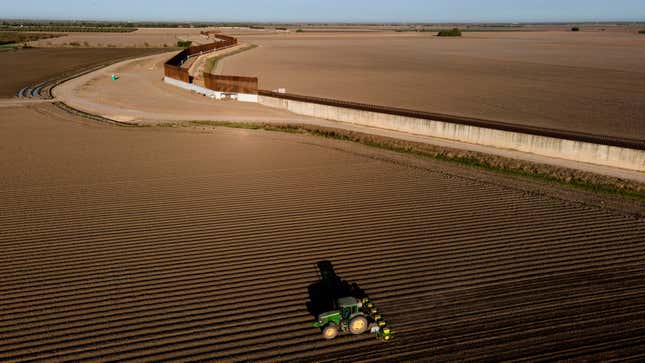
Former President Donald Trump’s border wall loomed large in American consciousness throughout his campaign and presidency—and wreaked a path of ecological destruction as he raced to fulfill his promise to build it. And while President Joe Biden has halted construction on the wall, what has been built (or more accurately, what hasn’t) is putting communities at the Texas-Mexico border in danger of flooding.
During construction of the wall in 2019 and 2020, levees that normally shield communities from the Rio Grande River were flattened by the Trump administration to make room for the border wall. Local television station KRGV reported last week that there are currently at least four weak points in the levee system near the border town of Mission, Texas, including one right next to an RV park.
Biden’s executive order—and lack of further action in Washington, DC—means that construction is on pause, leaving these levees flattened and communities at risk. Hidalgo County officials have warned that thousands of people in the area could be affected by a major rainstorm or hurricane because of the levee breaches, especially since much of the flood infrastructure in the region is already outdated.
“Much of Trump’s wall in south Texas is being built through the Rio Grande’s floodplain, a massive river that swells and floods seasonally,” Laiken Jordahl, a campaigner at the Center for Biological Diversity, told Earther in an email. “Building walls in a floodplain causes severe flooding danger and puts communities on both sides of the border at risk.”
Last Friday, Sen. John Cornyn, one of Texas’s two senators, wrote a letter to the Department of Homeland Security urging the agency to take action to repair the levees. “Leaving the levees in their current state could put more than 200,000 Texans in the path of catastrophic flooding as hurricane season rapidly approaches,” he wrote.
Flooding in the Rio Grande Valley—which is home to several growing counties, a large as well as underserved Hispanic population, and a rich agricultural industry—can cause serious damage. In 2010, Hurricane Alex slammed into the region, killing more than 30 and causing the Rio Grande to overflow, inundating roads and bridges along the border. Last year, Hurricane Hanna flooded streets and buildings and caused millions of dollars in damage to the agricultural sector.
While only 450 miles (724 kilometers) of Trump’s planned 2,000-mile (3,219-kilometer) wall was completed, it was executed at a breakneck pace—bypassing most required environmental review processes and planning laws, thanks in part to a Supreme Court decision that allowed the administration to proceed unencumbered. Jordahl noted that included the currently unbuilt but prepped section in Texas that could now lead to flooding is among the areas fast-tracked. In 2019, a coalition of green groups and other nonprofits and community organizations at the border, including the Center for Biological Diversity, banded together to submit comments to Customs and Border Patrol regarding their concerns with razing the levees to construct the wall.
“These concerns were completely ignored, not even responded to by CBP, and we watched in horror as wall construction crews began to destroy the levee system to build a wall that would only worsen the risk of flooding,” Jordahl said.
The fate of the levee system is a small part of the larger, looming questions that remain over the fate of Trump’s wall. On his first day in office, President Biden signed an executive order halting construction on the border wall and ordering a 60-day review of the project, declaring that “no more American taxpayer dollars be diverted to construct a border wall.” But the 60-day mark has come and gone, and the administration’s plans for the wall remain murky.
Local officials say CBP is responsible for fixing the levees; the Army Corps of Engineers issued a statement to KRGV that CBP and other agencies “continue to remain in constant communication about the condition of the excavated levees.” But the well-being of the region is tied up in the fate of the levees—which lie in the hands of the Biden administration.
“Trump’s desperation to build this ridiculous wall has put our entire region in severe danger,” said Jordahl. “Biden must step in and stop this madness by permanently halting wall construction.”